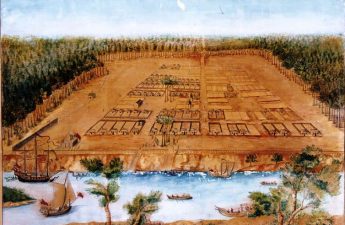The newspaper account below was erroneous. The young woman did not recover from the attack, which occurred on Sunday, Sept. 8. She died the next morning (100 years ago today). Contrary to popular opinion, Mae Crow’s rape and murder did not mark the beginning of racial turmoil in Forsyth County. People were already up in arms (literally) over an alleged (and very questionable) assault a few days before.
centennial
In the days to come, I’ll be posting more about Forsyth County events to commemorate the centennial of one of the worst outbreaks of racial violence in the 20th century—events which would eventually lead to Forsyth County becoming known as the nation’s most famous “Sundown Town.”
(Chapter Five of Brambleman contains a fictionalized account of these events.)
The Rape and Murder of Mae Crow in the Oscarville Community.
From the Gainesville News Sept. 9, 1912:
Ernest Knox, a sixteen year old negro boy, assaulted a young white girl, eighteen years old, near Oscarville, in Forsyth County last Sunday at 12 o’clock. She was going from her home to her aunts to assist her mother in bringing the children home and as she passed a secluded spot on the road Knox came upon her suddenly and dragged her into the woods, beat her over the head with a rock and criminally assaulted her. The girl was missed and her parents became alarmed at her absence. A searching party was organized but her body was not found until Monday morning at 9 o’clock. She lay unconscious in a pool of her blood. She was taken up by sympathizing friends and carried to her fathers house and Dr. John Hockenhull and Dr. G. P. Brice summonded. They gave her medical attention and she will likely recover.
Several negroes were arrested as suspects but at about 12 o’clock Ernest Knox confessed and he was rushed here in an automobile by Mr. Marvin Bell and others and landed in jail. On account of the intense feelings aroused by the attempted assault of another negro on a white woman last Thursday in Forsyth County it was almost certain that the negro would have been lynched had he been carried to Cumming. When it became known that the negro was in jail here and had confessed, there became wild rumors of lynching. To avert trouble it was deemed wise to have the negro removed to Atlanta for safe keeping. Accordingly, Deputy Henry Ward, with the negro and two other officers rushed Knox to Atlanta in an automobile and lodged him in jail at 12 o’clock Monday night.
A considerable crowd congregated about the jail Monday night about 9 o’clock. As soon as they became satisfied that the negro was gone they quietly dispersed and no further talk of trouble was heard.
Liked this post? Follow this blog to get more.



